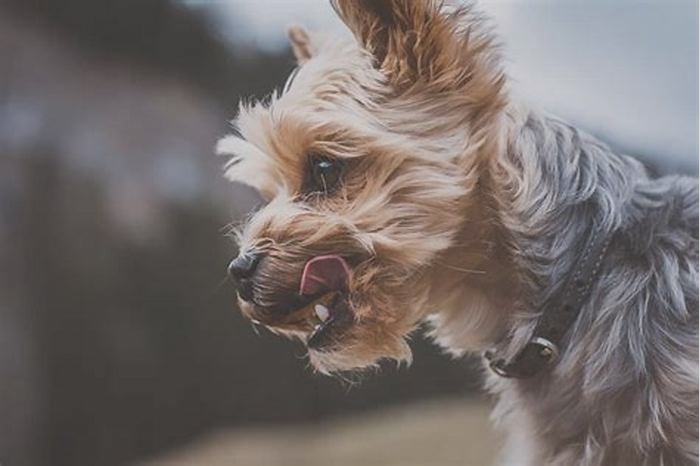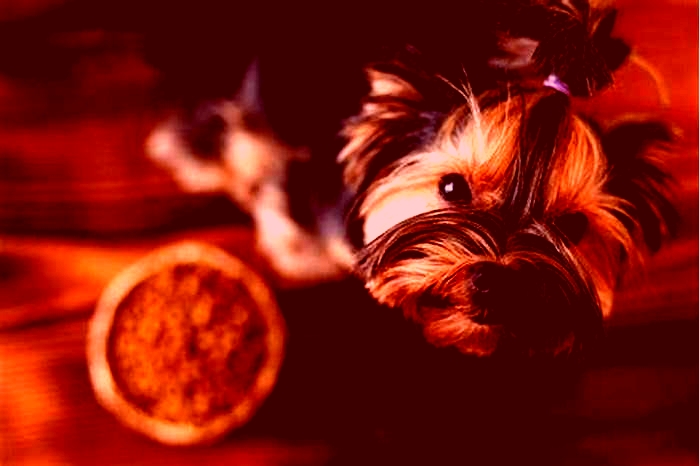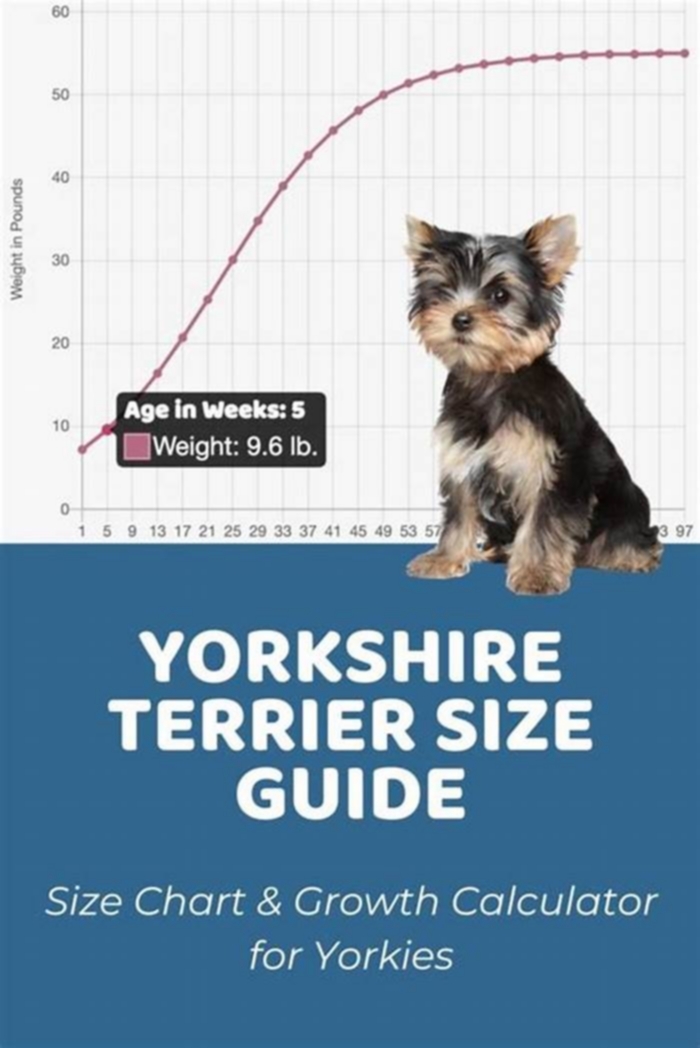What causes in Yorkies

Seizures In Yorkies: Causes, How Often, & What To Do
As a concerned Yorkie owner, its important to understand the various health issues that can affect your furry friend.
One such issue is seizures, which can be alarming and scary for both you and your Yorkie.
In this article, Ill discuss what seizures are, what causes them in Yorkies, and how to handle them if they occur.
Everything you need to know is below!

Seizures in yorkies
Seizures are a symptom of an underlying health issue and should be taken seriously. They can indicate a range of health issues, including epilepsy, liver disease, kidney disease, brain tumors, and infections.
Its important to note that not all seizures are the same. They can vary in frequency, duration, and intensity.
Some seizures may be mild and short-lived, while others can last several minutes and be more severe.
Its important to seek veterinary care if your Yorkie experiences a seizure, especially if its the first time theyve had one.
What exactly is a seizure in a yorkie?
A seizure is an episode of abnormal electrical activity in the brain that causes a range of symptoms.
During a seizure, a Yorkies body may shake or twitch uncontrollably, they may lose consciousness, and they may foam at the mouth.
Seizures can be frightening for both the Yorkie and their owner, but its important to remain calm and seek veterinary care.


Signs of a seizure
The signs of a seizure can vary depending on the type and severity of the seizure. Some common signs include:
- Shaking or twitching
- Loss of consciousness
- Foaming at the mouth
- Confusion or disorientation
- Stiffness or rigidity
- Excessive drooling
- Loss of bladder or bowel control
If you notice any of these signs in your Yorkie, its important to seek veterinary care immediately.
Types of seizure in yorkies
There are several types of seizures that can affect Yorkies, including:
- Generalized seizures: These seizures affect the entire body and can cause shaking, loss of consciousness, and foaming at the mouth.
- Focal seizures: These seizures only affect a specific part of the body, such as the face or limb, and can cause twitching or jerking.
- Psychomotor seizures: These seizures can cause the Yorkie to exhibit odd behaviors, such as biting at the air or running in circles.
- Cluster seizures: These seizures occur in clusters, with several seizures happening within a short period of time.
- Status epilepticus: This is a medical emergency and occurs when a seizure lasts for more than five minutes or if the Yorkie has several seizures in a row without regaining consciousness.
Official Info Resource: Types of Seizures in Dogs
What causes yorkies to have Seizures
Seizures can be caused by a variety of factors, including:
- Genetics: Yorkies, like some other breeds, may have a genetic predisposition to developing seizures. Some research suggests that the gene responsible for this may be passed down from parent to offspring.
- Liver disease: Liver disease can cause a buildup of toxins in the bloodstream, which can affect the brain and lead to seizures. Yorkies are known to be susceptible to liver disease, so its important to monitor their liver function through regular check-ups and blood work.
- Brain tumors: Tumors in the brain can put pressure on surrounding tissue and disrupt normal brain activity, leading to seizures. This is more common in older Yorkies.
- Head injury: Trauma to the head, such as from a fall or car accident, can cause seizures. Its important to take steps to prevent head injuries in your Yorkie, such as keeping them on a leash when outdoors and providing a safe environment indoors.
- Infectious diseases: Certain infectious diseases, such as canine distemper or encephalitis, can cause seizures in Yorkies. Vaccination is key to preventing these diseases, so its important to ensure that your Yorkie is up to date on all recommended vaccinations.
- Toxin exposure: Exposure to certain toxins, such as lead or antifreeze, can cause seizures in Yorkies. Its important to keep potentially toxic substances out of reach of your Yorkie and to monitor them closely when they are outdoors.
- Hypoglycemia: Low blood sugar levels can cause seizures in Yorkies, particularly in young puppies. Feeding your Yorkie a balanced and regular diet can help prevent hypoglycemia.
Our of the causes listed above, the most common causes of seizures in Yorkies are genetics, liver disease, and brain tumors.
Yorkies are more prone to liver disease than many other breeds, and tumors in the brain are more common in older dogs.
How to handle an ongoing seizure
If your Yorkie experiences a seizure, its important to remain calm and seek veterinary care immediately. That the first piece of advice.
During the seizure, try to keep your Yorkie safe by removing any objects that could harm them, such as furniture or sharp objects.
You should also avoid restraining your Yorkie or putting anything in their mouth, as this can cause injury.
After the seizure has ended, you should take your Yorkie to the vet for an evaluation. Your vet may run tests to determine the underlying cause of the seizure, such as blood work, a urinalysis, or imaging tests such as an MRI or CT scan.
If your Yorkie has frequent seizures, your vet may prescribe medication to help control them. Its important to follow your vets instructions for administering medication and to keep all follow-up appointments to monitor your Yorkies progress.
Are seizures common in yorkies?
Unfortunately yes, seizures are considered common in Yorkies.
According to some estimates, up to 5% of all Yorkies may experience seizures at some point in their lives. (which is far more than other breeds)
However, its important to note that not all seizures are caused by the same underlying factors, and some Yorkies may be more prone to seizures due to genetic factors, while others may develop seizures due to health issues such as liver disease or brain tumors.
If youre concerned about your Yorkies risk of developing seizures, its important to discuss any concerns with your vet and to ensure that your Yorkie receives regular check-ups to monitor their health. By working closely with your vet and being proactive about your Yorkies health, you can help minimize their risk of developing seizures and other health issues.
Last thoughts
Seizures can be a scary experience for both you and your Yorkie, but its important to remain calm and seek veterinary care immediately.
By understanding the signs of a seizure, the types of seizures that can affect Yorkies, and the underlying causes, you can be better prepared to handle a seizure if it occurs.
Remember to take your Yorkie to the vet for regular check-ups and to follow any treatment plans recommended by your vet to help manage seizures.
With proper care and attention, you can help your Yorkie live a happy and healthy life, even in the face of seizures.
Helpful resources:
Veterinary Emergency Group Seizures
VCA Hospitals Dog Seizure Advice
Disclaimer
Before making any decisions that could affect the health and/or safety of your dog, you should always consult a trained veterinarian in your local area. Even though this content may have been written/reviewed by a trained veterinarian, our advice to you is to always consult your own local veterinarian in person. Please read our full dislcaimer if you have any questions.Dealing with Yorkie Rotten Teeth: Causes, Symptoms, and Treatment Options
Yorkshire Terriers, or Yorkies, are small and energetic dogs that make great companions. As with any breed, they have their own set of health issues that owners need to be aware of. One of the most common problems that Yorkies face is rotten teeth. This can cause pain and discomfort for the dog, making it difficult for them to eat and leading to more serious health problems if left untreated.
There are several factors that can contribute to Yorkie rotten teeth, including genetics, diet, and hygiene. While some of these factors are beyond your control, there are steps you can take to minimize the risk and keep your Yorkies teeth healthy. In this article, we will cover the causes, symptoms, and treatment options for Yorkie rotten teeth, as well as preventative measures you can take to keep your furry friends teeth in top shape.
If you notice any signs of dental problems in your Yorkie, it is important to seek veterinary care right away. Dental issues can progress quickly and even lead to more severe health conditions, so early intervention is key. By staying informed and taking a proactive approach to your Yorkies dental health, you can help them live a happy and healthy life.
Understanding Yorkie Rotten Teeth and How to Deal with Them
Yorkshire Terrier, also known as Yorkie, is a small breed of dog that is loved by many for their cute and lovable features. Like any other dog, a Yorkie is also susceptible to dental problems such as rotten teeth. Rotten teeth can cause discomfort, pain, and eventually, tooth loss if not addressed immediately. Therefore, as a Yorkie owner, it is essential to understand the causes, symptoms, and treatment options for rotten teeth to provide your pet with the necessary care.
Causes of Yorkie rotten teeth can vary, but the most common causes are poor dental hygiene and a diet rich in sugar and carbohydrates. Bacteria present in the mouth feed on the sugar and carbohydrates, resulting in the formation of plaque and tartar. When the plaque and tartar accumulate, they cause tooth decay and eventually lead to rotten teeth. Other factors that contribute to rotten teeth include oral injuries, genetics, and certain medications.
One of the symptoms of rotten teeth in Yorkies is bad breath. Other signs include yellow or brown discoloration of teeth, gum swelling and bleeding, and difficulty eating or chewing. If you notice any of these symptoms, it is crucial to consult your veterinarian immediately to prevent further damage.
Treatments for Yorkie rotten teeth depend on the severity of the condition. The most common treatment options are dental cleaning, extraction, and root canal. Dental cleaning involves removing the plaque and tartar build-up through scaling and polishing, while extraction involves removing the affected tooth. Root canal, on the other hand, is a more complex procedure that involves removing the infected pulp and filling the canal to prevent further damage.
- In conclusion, Yorkie rotten teeth are a common problem that requires immediate attention. As a Yorkie owner, it is essential to maintain good dental hygiene and avoid feeding your pet a diet rich in sugar and carbohydrates. Additionally, regular visits to the veterinarian and early detection of any dental problems can help prevent further damage.
Causes of Yorkie Rotten Teeth
Yorkies are small and adorable dogs that are prone to dental issues, specifically if their teeth are not taken care of correctly. Poor dental hygiene is the leading cause of rotten teeth in Yorkies. When food particles are not cleared correctly from the teeth, they accumulate, and bacteria form, leading to an infection. Some Yorkies love eating human food, which contains high sugar content that also creates an environment for bacteria to grow and leads to tooth decay.
Enamel hypoplasia is another leading cause of rotten teeth in Yorkies. This condition is caused when a pups teeth do not develop correctly, resulting in a fragile enamel layer. Yorkies with this condition have teeth that are weak and break quickly; thus, the teeth quickly decay.
Other factors that contribute to rotten teeth in Yorkies include age, genetic conditions, and underlying medical problems. Aging Yorkies are more susceptible to teeth decay, and some health issues, such as kidney disease and diabetes, can lead to dental problems if left untreated.
Yorkies are small dogs that are prone to dental issues, specifically if their teeth are not taken care of correctly. Poor dental hygiene is the leading cause of rotten teeth in Yorkies. Enamel hypoplasia, age, genetic conditions, and underlying medical problems also contribute to dental problems in Yorkies. Regular check-ups and cleaning are essential for preventing dental issues in Yorkies; if left untreated, rotten teeth can lead to severe health problems.
Recognizing the Symptoms of Rotten Teeth in Yorkies
Yorkies are susceptible to dental issues just like any other breed, but their small size puts them at greater risk due to overcrowding in the mouth. One of the most common dental problems in Yorkies is rotten teeth, which can lead to serious health issues if left untreated. Its important to know the signs of rotten teeth in Yorkies so you can address the problem quickly.
The most obvious symptom of rotten teeth in Yorkies is bad breath or halitosis. If your Yorkies breath smells foul even after brushing their teeth, its a red flag. Another symptom is difficulty eating or not eating at all. Rotten teeth can cause pain and discomfort while eating, so your Yorkie may begin to avoid food altogether. Other symptoms include lethargy, pawing at the mouth, swollen gums or bleeding, and loose or missing teeth.
If you notice any of these symptoms in your Yorkie, its important to take them to the vet immediately for a thorough dental exam. The vet can identify the cause of the rotten teeth and recommend treatment options based on the severity of the problem. Treatment options may include teeth cleaning, extractions, or antibiotics to treat any infections that may have developed due to the rotten teeth.
- Brush your Yorkies teeth regularly to prevent dental issues from developing
- Monitor your Yorkies diet and avoid sugary or starchy foods that can contribute to dental problems
- Provide dental chews or toys to help keep your Yorkies teeth clean and healthy
By recognizing the symptoms of rotten teeth in Yorkies and taking preventative measures, you can keep your furry friends teeth healthy and prevent serious health issues from developing. Regular dental care is essential for the overall health and well-being of your Yorkie.
Treatment Options for Yorkies with Rotten Teeth
Yorkshire Terriers or Yorkies are prone to dental problems and one of the most common issues they face is rotten teeth. Rotten teeth in Yorkies can be caused by a number of factors such as poor dental hygiene, genetic disposition, diet, and age.
If you suspect that your Yorkie has rotten teeth, it is important to take them to the vet for a check-up as soon as possible. Depending on the severity of the condition, the vet may recommend one of several treatment options.
- Dental Cleaning: The first step in treating rotten teeth in Yorkies is to clean their teeth thoroughly. This will involve a deep cleaning of the teeth and gums under anesthesia. Any bad teeth may also need to be extracted during this procedure.
- Antibiotics: If the infection caused by rotten teeth has spread to other parts of the body, the vet may prescribe antibiotics to prevent further complications to the dogs health.
- Dietary Changes: A healthy diet plays a critical role in preventing dental problems in Yorkies. The vet may recommend a diet that is high in protein but low in carbohydrates as carbohydrates promote the growth of harmful bacteria in the mouth.
- Dental Chews and Toys: Regular use of dental chews and toys can help reduce the build-up of plaque and tartar on your Yorkies teeth, which can prevent further dental problems in the future.
- Oral hygiene: Regular brushing and cleaning of you Yorkies teeth can help prevent dental problems. The vet may recommend a special toothpaste and toothbrush that is specifically designed for dogs.
In conclusion, if you suspect that your Yorkie has rotten teeth, it is important to take immediate action to prevent further complications. With the right treatment options and preventive care, you can help your Yorkie maintain healthy teeth and gums for a lifetime of happy, healthy smiles.
How to Prevent Rotten Teeth in Yorkies
Yorkies are lovable little dogs that require special attention to maintain good oral hygiene. Rotten teeth in Yorkies is a common problem that can lead to discomfort, pain, and even tooth loss. Fortunately, there are steps you can take to prevent rotten teeth in your furry friend.
Causes of Rotten Teeth in Yorkies
The primary cause of rotten teeth in Yorkies is poor dental hygiene. When food particles are left in the mouth, they can quickly turn into plaque, which eventually hardens into tartar. Over time, tartar buildup can lead to gum disease, tooth decay, and even tooth loss. Additionally, certain foods can be more likely to cause tooth decay, especially sugary and starchy treats.
Symptoms of Rotten Teeth in Yorkies
Its essential to detect rotten teeth in Yorkies early to prevent further damage. The most common signs of rotten teeth in Yorkies include bad breath, yellow or brown teeth, swollen or bleeding gums, and loose teeth. If you notice any of these symptoms, its crucial to talk to your vet as soon as possible.
Treatment Options for Rotten Teeth in Yorkies
The most common treatment option for rotten teeth in Yorkies is a teeth cleaning procedure performed by a veterinarian. This procedure involves scaling the teeth to remove tartar and plaque buildup, followed by polishing to smooth the teeth surfaces. In severe cases, the vet may need to extract one or more teeth. Additionally, daily brushing and a healthy diet can help prevent rotten teeth from recurring.
- Brush your Yorkies teeth daily with a dog-specific toothbrush and toothpaste.
- Avoid giving your dog sugary and starchy treats that can contribute to tooth decay.
- Provide your Yorkie with plenty of chew toys to help clean their teeth naturally.
- Take your Yorkie to the vet for regular dental cleanings and checkups.
By following these preventative measures, you can help keep your Yorkies teeth healthy and strong. Remember, prevention is the key to ensure your furry friend lives a happy and healthy life.









